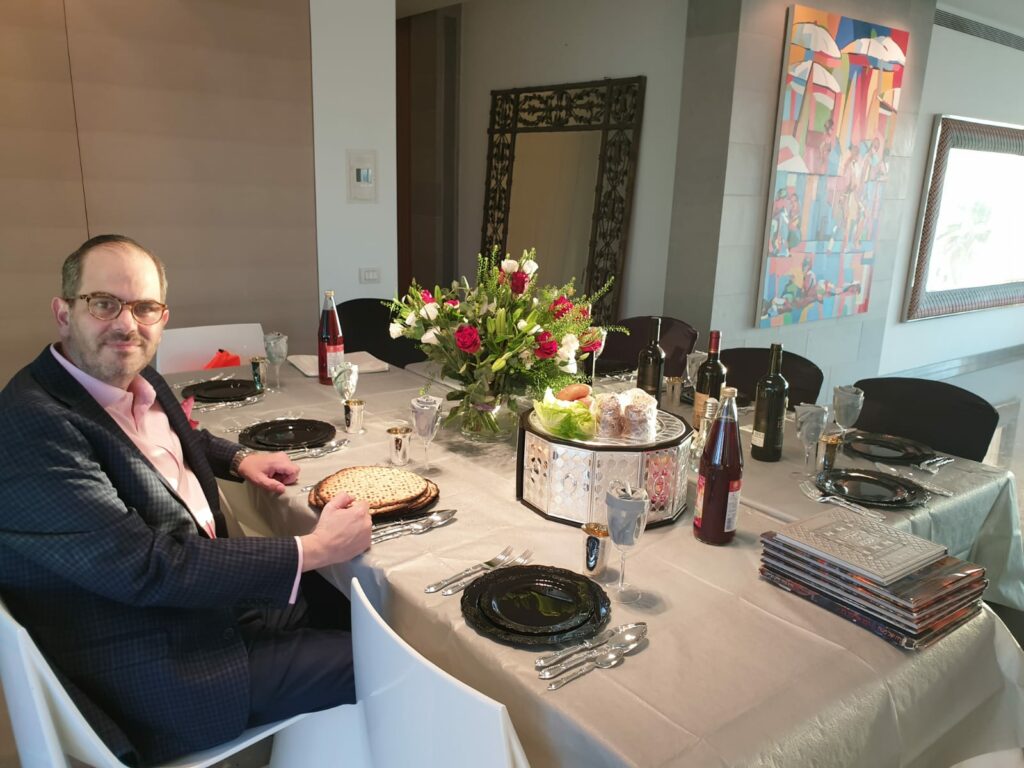By Rabbi Yair Hoffman for 5tjt.com
Pesach is filled with Halachic questions. Halachic Hotlines across the country are ringing off the hook. One of the biggest questions that is often asked, however, is the status of inviting a non-observant relative or friend for Yom Tov who will probably drive back home after the Seder is over.
There are actually two issues involved. The first issue, of course, is Lifnei Iver – placing a stumbling block before the blind. We do not wish to cause a fellow Jew to stumble in Torah law.
Rav Moshe Feinstein zt”l addressed this issue in two responsa (Igros Moshe, OC 1:98, 3:71) to a Rabbi who was considering inviting people to shul who would drive on Shabbos. Rav Feinstein not only forbids it, but he also introduces the idea that someone who causes someone to violate any prohibition is considered a Meisis – an enticer in Halacha.
A number of Poskim have qualified Rav Feinstein’s position as having been issued in a time and place when the Kiruv movement had not yet developed. Rav Moshe Shternbuch in his T’shuvos V’hanhagos (OC 1:358) rules that it is permissible, but there are three important caveats:
- To minimize Chilul Hashem – desecration of Hashem’s Name, one should ensure that the guests be circumspect and not park in front of the house on Shabbos.
- The host must inform the guest of the centrality of Shabbos, the seriousness of violating it, and the sweetness of observing it.
- Giving an option to remain there and not violate Shabbos is a requirement that many Poskim require as well.
The second issue is a little known halachah that is found in Shulchan Aruch (OC 512:1), where it is actually forbidden to invite a Cuthite because of the concern that one may come to cook for them. The Mishna Brurah extends this to anyone who does not keep Shabbos publicly. Compunding the difficulty, is that it is clear from the Pri Magadim that the prohibition is not just to cook for them, but even to invite them. This position was repeated by Rav Shlomo Zalman Auerbach zatzal in his novella on the Gemorah.
This is an issue that many Poskim have struggled with, particularly in a situation where the host issuing the invite does so in order to bring the guest closer to Torah and Mitzvos.
Although each person should consult his own Rav or Posaik, the basis that some Poskim use for leniency is as follows:
1] It is not clear exactly who is a public Shabbos violator, and what constitutes “public” in the eyes of halachah. Some Poskim are of the opinion that only farm work, avodas karka, is considered a “public” desecration of Shabbos. Certainly other forms of Shaabbos violation are biblically prohibited, but perhaps they may not be considered “public” for the purposes of this halachah.
2] There are Rishonim that rule in accordance with the view that the “extra cooking” that happens here is a Rabbinic prohibition – not a biblical one. Even though this is a minority view, a possible proponent of this approach is the Rashba. And while we cannot take this view against both the Rambam and the Shulchan Aruch, in combination with the first factor when dealing with the possibility of bringing someone closer to Torah – there may be room to be lenient.
3] There is also the view of the Yaaros Dvash who differentiates between Chuthites and a Mumar l’chalel Shabbos, a Shabbos violator. The Yaarov Dvash’s view is against that of the Mishnah Brurah and it was also only said in a Drasha and not in a halachic venue. Nonetheless, some Poskim cite his view in combination with the other two factors to be lenient.
Shockingly enough, the issue is not limited to homes. What about the hundreds of Kosher Pesach hotel programs over Pesach? How do they deal with this second factor of inviting or hosting a possible open Shabbos violator among their guests? Rav Eliezer Waldenberg in his Tzitz Eliezer (Volume VIII #17) deals with the question and suggests some of the aforementioned possibilities as a reason to be lenient.
Other factors mentioned by Rav Shlomo Zalman Auerbach (Halichos Shlomo, Pesach) to be lenient are the Mitzvah of Kivud Av v’Aim – honoring parents, and of Aivah causing serious hate. These are all factors to be lenient, but as mentioned earlier, each person should consult his own halachic authority.
May we all be zocheh to a complete Geulah very soon.
The author can be reached at [email protected]












3 Responses
How about preference of Non Mevushol wine for Seder then having to be sacrificed to Mevushol wine in order to have non religious people at Seder?
Eli at his Seder table on Pesach Sheni. He is irrelegious, that Eli.
Sorry but you missed the boat. Yom Tov is not shabbos and there is a totally different issue. One may not cook or give cooked food to a michalel shabbos! Makes no difference if he wlked or drove to your house. The Torah only permits cooking on Yom Tov for those who are shomer Torah. M’d’rabbanan – even food cooked BEFORE yom tov is forbiden to give to a non shomer Torah.